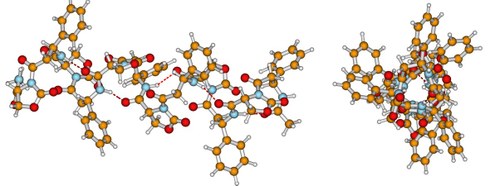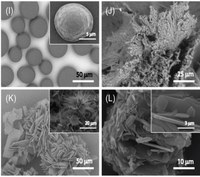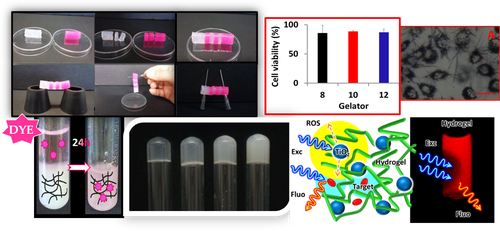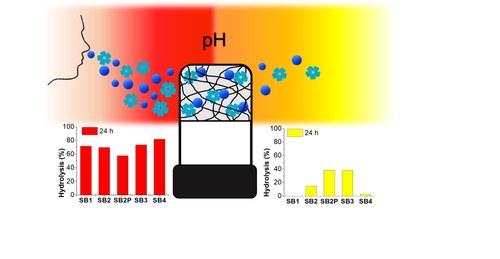RESEARCH
Our research group has a consolidated experience in the synthesis, characterization and application of novel spatially ordered pseudopeptides and of peptidic supramolecular materials.

SYNTHESIS OF NON-NATURAL FOLDAMERS
Foldamers are discrete artificial oligomers that adopt specific and stable conformations similar to those seen among proteins and nucleic acids. This neologism means “folding molecules” and refers mainly to medium size molecules (about 500-5000 amu) that fold into definite secondary structures (i.e. helices, turns and sheets), thus being able to mimic biomacromolecules despite their smaller size. The essential requirement of a foldamer is to possess a well defined, repetitive secondary structure, imparted by conformational restrictions of the monomeric unit.
Our group focuses in the synthesis of peptidomimetic foldamers in order to study the Chiral Induced Spin Selectivity (CISS) effect. This project is shared with other Italian Universities through a Research Project of National Interest (PRIN).

SUPRAMOLECULAR MATERIALS
We observed that some classes of oligomers tend to assume a structure ordered in solid phase. So we studied the solid-phase properties of some foldamers containing aromatic rings, by means of SEM and TEM spectroscopy, X-ray powder diffraction and single crystal and IR and solid phase NMR. Depending on the characteristics of the single compound, the solids assemble to form fibres, fibrils, plates, crystals, gels or simple amorphous solids.
Recently we focused our attention on the preparation of small oligomers incorporating L-DOPA, to obtain synthetic adhesives inspired to mussels. Indeed DOPA is related to a variety of different adhesion mechanism, not fully understood yet, involving hydrogen bonding, metal-oxide coordination, cation-π and hydrophobic interactions, all depending also on the characteristics of the surrounding environment (such as pH, ions concentrations, material of the surfaces to attach).

SUPRAMOLECULAR HYDROGELS AND ORGANOGELS
We managed to prepare supramolecular gels by self-assembly of small chiral molecules. These materials have several applications, especially in the biomedical field, as the use of compounds containing common and/or unusual amino acids allows the formation of gels that are completely biocompatible. We prepared gels for water remediation, able to absorb and photo-degrade pollutants, gels able to support cellular growth and to reinforce scaffolds for tissue engineering, gels for the controlled growth of crystals with application in the biomineralization field.

BIOCOMPATIBLE MATERIALS FOR COSMETICS INDUSTRY
We are involved in studies on soft materials, natural products, fragrances useful for cosmetic industries. The group is interested in establishing collaborations with private companies, mainly in the preparation and analysis of fragrances and soft cosmetics.
These studies are in connections with our new Master Degree Advanced Cosmetic Sciences that is especially devoted to prepare chemists that will be employed in cosmetic companies.